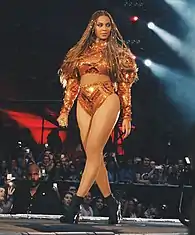Grammy Award for Best Progressive R&B Album
The Grammy Award for Best Progressive R&B Album is an honor presented at the Grammy Awards, a ceremony that was established in 1958 and originally called the Gramophone Awards,[1] to recording artists for quality works on albums in the urban contemporary subgenre within the R&B field. Honors in several categories are presented at the ceremony annually by the Recording Academy of the United States to "honor artistic achievement, technical proficiency and overall excellence in the recording industry, without regard to album sales or chart position".[2]
| Grammy Award for Best Progressive R&B Album | |
|---|---|
| Awarded for | quality progressive R&B music albums |
| Country | United States |
| Presented by | The Recording Academy |
| First awarded | 2013 |
| Currently held by | Lizzo, Cuz I Love You (Deluxe) (2020) |
| Website | grammy.com |
This category was one of the three newly created categories for the 55th Annual Grammy Awards as Best Urban Contemporary Album. In June 2020, the Recording Academy announced a renaming and redefining of the category. Its new name was Best Progressive R&B Album, with immediate effect, "to appropriately categorize and describe this subgenre. This change includes a more accurate definition to describe the merit or characteristics of music compositions or performances themselves within the genre of R&B".[3] Adding to this, the description of this category is now as follows: "[t]his category is intended to highlight albums that include the more progressive elements of R&B and may include samples and elements of hip-hop, rap, dance, and electronic music. It may also incorporate production elements found in pop, euro-pop, country, rock, folk, and alternative."[3]
According to Recording Academy president Harvey Mason Jr. in the same press release, these changes reflected "the current state of the music industry and how it's evolved over the past 12 months." In the weeks leading up to this decision, the label "urban" to indicate music made by African American musicians, songwriters and producers had come under fire.[4]
The award goes to the artist, producer and engineer/mixer, provided they are credited with more than 50% of playing time on the album. A producer and engineer with less than 50% of playing time, as well as the mastering engineer, can apply for a "Winners Certificate".[5]
Controversies
Many African American musicians have disputed the use of the term "urban contemporary", seen as a "catchall for music created by Black artists, regardless of genre".[6] In a backstage interview given after his first Grammy win, artist Tyler, the Creator stated that "[i]t sucks that whenever we — and I mean guys that look like me — do anything that's genre-bending or that's anything, they always put it in a rap or urban category", adding that "I don't like that 'urban' word — it's just a politically correct way to say the n-word to me".[7]
Recipients


| Year[I] | Performing artist(s) | Work | Nominees | Ref(s) |
|---|---|---|---|---|
| 2013 | Frank Ocean | Channel Orange | [8] [9] | |
| 2014 | Rihanna | Unapologetic |
|
[10] [9] |
| 2015 | Pharrell Williams | Girl | [11] [9] | |
| 2016 | The Weeknd | Beauty Behind the Madness | [12] [9] | |
| 2017 | Beyoncé | Lemonade |
|
[13] [9] |
| 2018 | The Weeknd | Starboy | [14] [9] | |
| 2019 | The Carters | Everything Is Love | [15] [9] | |
| 2020 | Lizzo | Cuz I Love You (Deluxe) | [16] [9] | |
| 2021 | TBA | TBA |
|
[17] |
^[I] Each year is linked to the article about the Grammy Awards held that year.
Artists with multiple nominations
- 3 nominations
- Beyoncé (one as The Carters)[18]
- Miguel
- 2 nominations
See also
References
- "Grammy Awards at a Glance". Los Angeles Times. Tribune Company. Archived from the original on July 13, 2011. Retrieved January 6, 2011.
- "Overview". Grammy.com. The Recording Academy. Archived from the original on October 27, 2009. Retrieved May 14, 2011.
- "The Recording Academy Announces Changes For 63rd Annual GRAMMYs, Releases Rules And Guidelines". Grammy.com. The Recording Academy. June 10, 2020. Retrieved June 14, 2020.
- Minelle, Bethany (June 8, 2020). "Republic Records drops term 'urban' to describe music made by black artists". Sky News. Retrieved June 14, 2020.
- "Grammy Blue Book (edition 2021)" (PDF). Grammy.com. The Recording Academy. June 10, 2020. Retrieved June 14, 2020.
- Lewis, Sophie (June 11, 2020). "Grammy Awards renames controversial "urban" category". CBS News. Retrieved June 14, 2020.
- Owoseje, Toyin (January 27, 2020). "Tyler, The Creator slams Grammys' 'urban' category as a politically correct version of the n-word". CNN. Retrieved June 14, 2020.
- "Frank Ocean, fun. lead 2013 Grammy Award nominations". MTV. December 6, 2012. Retrieved September 11, 2020.
- "GRAMMY Awards Winners & Nominees for Best Urban Contemporary Album". Grammy.com. The Recording Academy. Archived from the original on September 5, 2020. Retrieved September 5, 2020.
- "56th Annual GRAMMY Awards Nominees". Grammy.com. The Recording Academy. Archived from the original on December 9, 2013. Retrieved September 11, 2020.
- Oldenburg, Ann (December 5, 2014). "2015 Grammy nominations roll out". USA Today. Retrieved September 11, 2020.
- Billboard Staff (December 7, 2015). "Grammy Nominations 2016: See the Full List of Nominees". Billboard. Retrieved September 11, 2020.
- Johnston, Maura (December 6, 2016). "Grammy nominations 2017: Beyoncé and R&B artists shine while rock suffers". The Guardian. Retrieved September 11, 2020.
- "60th GRAMMY Awards: Full Nominees List". Grammy.com. The Recording Academy. November 28, 2017. Archived from the original on December 2, 2017. Retrieved September 11, 2020.
- Snapes, Laura (December 7, 2018). "Grammy nominations 2019: Cardi B, Kendrick Lamar and Drake lead the pack". The Guardian. Retrieved September 11, 2020.
- Beaumont-Thomas, Ben (November 20, 2019). "Lizzo, Billie Eilish and Lil Nas X top 2020 Grammy nominations". The Guardian. Retrieved September 11, 2020.
- "2021 GRAMMYs: Complete Nominees List". Grammy.com. The Recording Academy. November 24, 2020. Retrieved November 24, 2020.
- "Beyoncé Knowles". Grammy.com. The Recording Academy. Retrieved November 26, 2019.
- "Steve Lacy-Moya". Grammy.com. The Recording Academy. Retrieved November 26, 2019.
